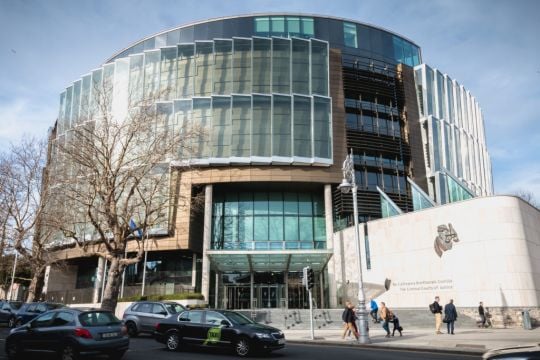A man has been remanded in custody charged with the murder of a schoolboy in Dublin last week.
The 16-year-old suffered fatal injuries and was rushed to the Mater Hospital but was later pronounced dead.
The secondary schoolboy cannot now be identified due to a court order based on a recent ruling prohibiting the news media from identifying deceased child victims.
However, today when the case came before Dublin District Court, the presiding judge extended anonymity to the adult accused despite pleas from the media to set out the basis for that decision.
The man, who is in his mid-thirties, was charged this afternoon and brought to appear before Judge John Campbell at Dublin District Court.
The accused, a foreign national who has lived in Dublin for several years, was charged with murder of the boy and production of a knife during a dispute.
Reporting restrictions
At the start of the hearing, Judge Campbell told reporters: “there are reporting restrictions with respect to the accused, and the victim”.
The man, dressed in a blue jacket and cream trousers, listened to the proceedings with the aid of an interpreter. He has not yet indicated how he will plead.
The teenage boy’s mother watched on silently from the back of the courtroom. She wore a T-shirt with a slogan calling for justice for her son.
Detective Sergeant Shane Noone told Judge John Campbell that he charged the man at 1.47pm. The defendant made “no reply” to the murder charge and in response to the weapon allegation, he answered: “This is the charge, or this is the final decision”.
Detective Sergeant Noone made an application under section 252 of the Children Act for the media to be prohibited from naming the victim.
A bail application in a murder case can only be heard by the High Court.
Defence counsel Barry Ward, instructed by solicitor Sinead Mulhall, said his client was not a person of means. Legal aid was granted.
The accused, who did not address the court, was remanded in custody to appear via video-link at Cloverhill District Court on Thursday.
Anonymity order
Solicitor Fergus Foody, on behalf of Independent News & Media (INM), then made an application in relation to the anonymity order.
He asked the judge to clarify one aspect of his reporting restriction ruling. Clearly section 252 applied in relation to the deceased, he said, but the basis for no identification of the accused was not clear, he submitted.
“My view, is that the identification of the accused could give way to identification of the victim, and the victim must be protected,” the judge replied.
“In my view, the name of the accused should be prohibited,” he continued.
The INM solicitor said that he had not been given any basis at which the judge replied, “I have made my decision”, and he left the bench.
Childrens Act
As a matter of law, the deceased can no longer be named as a result of a ruling, in another case, in the Court of Appeal last year. It found that the anonymity provisions of the Children Act can also apply to deceased child victims of crime.
Section 252 (1) of the Children Act, 2001 states: "In relation to any proceedings for an offence against a child or where a child is a witness in any such proceedings, no report which reveals the name, address or school of the child or includes any particulars likely to lead to his or her identification”.
"No picture which purports to be or include a picture of the child or which is likely to lead to his or her identification” shall be published or included in a broadcast, it also states.
Ruling on the issue in the Court of Appeal last year, Mr Justice George Birmingham, had said the language in this section of the legislation was "clear and unequivocal" and that if it were to be changed it would be a decision for the Oireachtas.







